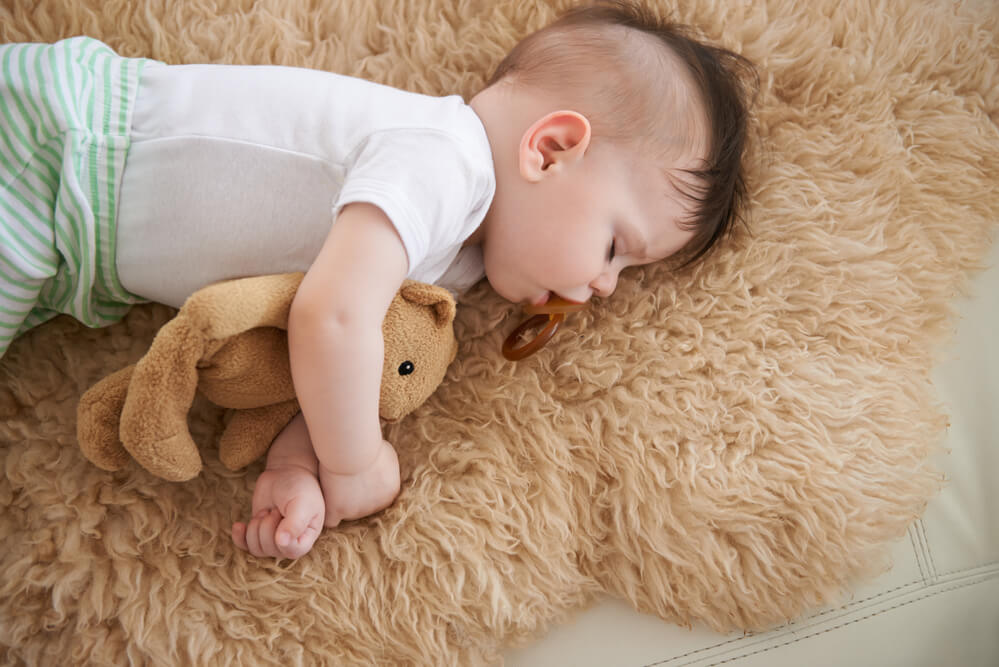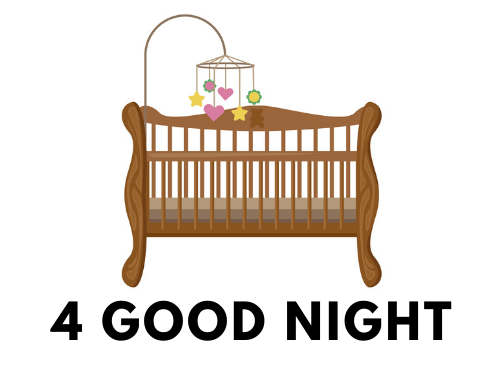Introduction
Having a baby is a beautiful journey filled with precious moments and yes, plenty of challenges too. One such challenge that every new mom faces is deciphering her baby’s sleep schedule, especially when the little one hits the 8-month mark.
In this article, we will delve into everything you need to know about your 8-month-old’s sleep schedule, from understanding their changing sleep patterns to dealing with common sleep problems and creating a comforting bedtime routine. Your journey to better nights and peaceful naps starts here.
Understanding Your 8-Month-Old’s Sleep Pattern: Key Changes
At around eight months, your baby’s sleep patterns may start to shift. The two to three naps they were taking daily may reduce to just two.
Additionally, nighttime sleep may lengthen, with most babies this age sleeping about 11 hours at night. It’s a transition phase and every baby is unique, so don’t worry if your baby doesn’t follow this exact pattern. It’s all about observing and understanding their unique sleep needs.
Importance of Developing an 8-Month-Old Sleep Schedule
A predictable sleep schedule helps create a sense of security for your baby. It makes them understand what to expect next. Consistent sleep times also contribute to better sleep quality and duration. More importantly, a well-rested baby is generally a happier, more content baby.
So, establishing a consistent sleep schedule for your 8-month-old can make a big difference in your baby’s mood and overall development.
Ideal Sleep Duration for an 8-Month-Old: Nighttime and Nap Times
An 8-month-old baby typically needs about 12 to 16 hours of sleep in a 24-hour period. This includes nighttime sleep and daytime naps. Most babies will sleep for about 11 hours at night and take two naps during the day, each lasting about 1.5 to 2 hours. Keep in mind, though, these are averages and individual sleep needs can vary.

Typical Night-Waking Episodes in 8-Month-Old Babies
Around this age, your baby might experience what’s known as ‘sleep regression’, which can mean waking up more frequently during the night. This can be due to developmental milestones, teething, or just an adjustment to their evolving sleep patterns.
It’s essential to approach these awakenings with patience, responding to your baby’s needs without creating new sleep associations or habits that might be challenging to change later.
Common 8-Month-Old Sleep Problems and Their Solutions
From separation anxiety to a sudden dislike of bedtime, sleep problems can suddenly appear at this stage. Try to maintain a consistent sleep routine, provide a comforting sleep environment, and ensure your baby isn’t hungry or uncomfortable. If sleep problems persist, it might be helpful to consult a pediatrician or a child sleep consultant for guidance.
Establishing a Bedtime Routine for Your 8-Month-Old Baby
A soothing, predictable bedtime routine can signal your baby that it’s time to sleep. This could include a warm bath, a bedtime story, or a lullaby. Consistency is key. Over time, your baby will associate these activities with sleep, making the transition from wakefulness to sleep smoother and less stressful.
Nap Transitioning Strate@gies for 8-Month-Old Babies
As your baby grows, they’ll gradually transition from three naps to two. Look for signs of readiness for this transition, like resisting the third nap or having difficulty sleeping at night. During this transition, ensure your baby is still getting adequate total sleep. This might mean temporarily moving bedtime earlier to compensate for the dropped nap.

Healthy Sleep Habits: Creating an Ideal Sleep Environment for 8-Month-Olds
A quiet, dark, and slightly cool room can create an ideal sleep environment for your baby. Consider using a white noise machine to block out potential disturbances.
A safe, comfortable crib with a firm mattress and fitted sheet is crucial. Avoid using loose blankets, pillows, or soft toys in the crib to reduce the risk of SIDS (Sudden Infant Death Syndrome).
Sleep Regression at 8 Months: Causes and Tips for Parents
At around eight months, your baby might experience a developmental leap often referred to as the ‘8-month sleep regression.’ This can disrupt their sleep as they’re learning new skills like crawling or pulling up. Remember, this phase is temporary. Try to maintain your baby’s sleep schedule and routine as much as possible during this time, providing comfort as needed without creating new, unsustainable sleep habits.
How to Handle Sleep Separation Anxiety in 8-Month-Olds
Around this age, some babies start experiencing separation anxiety, which can affect their sleep. They might cry when you leave the room or have difficulty settling to sleep without you. Try to develop a soothing bedtime routine that ends with you leaving the room before your baby falls asleep. This can help them learn to fall asleep independently, which can improve sleep for everyone.

The Role of Feeding in Your 8-Month-Old’s Sleep Schedule
At eight months, most babies are eating some solid foods, in addition to breast milk or formula. This new dietary change can affect their sleep schedule. Try to balance solids and milk feeds throughout the day, ensuring your baby isn’t hungry or overly full at bedtime. You might also start to consider gently night weaning if your baby is waking frequently to feed at night but eating well during the day.
Balancing Solid Food Intake and Its Effect on 8-Month-Old Sleep
As your baby starts eating more solids, they might start sleeping longer stretches at night. This is because solid foods can keep them feeling fuller longer. But too much solids and not enough milk can lead to nutritional imbalances. So it’s important to strike a balance. Follow your pediatrician’s guidelines for introducing solids and adjusting milk feeds.
Night Weaning Strategies for 8-Month-Old Babies
If your baby is still waking for feeds at night but eating well during the day, you might consider night weaning. Gradually reduce the amount they’re eating at each night feed over several nights, or try to soothe them back to sleep without feeding. Remember, it’s important to ensure your baby is getting enough to eat during the day before starting to night wean.
Soothing Techniques for Fussy 8-Month-Olds at Bedtime
Babies can become fussy at bedtime for a variety of reasons – overtiredness, hunger, or just wanting more time with you. Consider introducing a lovey or comfort object (safety guidelines permitting), using a white noise machine, or trying different soothing techniques like gentle rocking or singing. Experiment to see what works best for your baby.

Coping with Sleep Disruptions While@ Traveling with an 8-Month-Old
Travel can disrupt your baby’s sleep schedule. Try to maintain their sleep routine as much as possible, even when on the go. Bring familiar sleep items like a favorite blanket or comfort object. And remember, it might take a few days to get back on track once you’re home. Patience is key.
The Impact of Teething on the Sleep Patterns of 8-Month-Olds
Teething can cause discomfort and disrupt sleep. If your baby is teething, you might notice they have trouble settling at night or wake more frequently. Consider using a teething toy or consult your pediatrician for safe pain relief options. Remember, this is a temporary phase and your baby’s sleep will return tonormal once the tooth has erupted.
When to Seek Medical Help for Your 8-Month-Old’s Sleep Issues
While many sleep issues are part of normal development, sometimes there can be underlying medical issues like sleep apnea, reflux, or allergies. If your baby is consistently struggling to sleep, waking frequently at night, has irregular breathing during sleep, or is difficult to soothe, it might be worth discussing with your pediatrician.
Case Studies: Successful Sleep Training Methods for 8-Month-Olds
There are various sleep training methods, from the gentle ‘no tears’ methods to the more direct ‘cry it out’ method. Every baby is different, so what works for one might not work for another. Look out for our upcoming article featuring real-life experiences from parents who have successfully navigated sleep training with their 8-month-olds.
The Impact of Daycare on an 8-Month-Old’s Sleep Schedule
Daycare can affect your baby’s sleep schedule, as nap times at daycare might not align with their home schedule. Try to communicate with your daycare provider about your baby’s sleep needs and routine. Also, be prepared for some adjustments at home, like an earlier bedtime, to ensure your baby gets enough sleep.
Frequently Asked Questions About 8-Month-Old Sleep Patterns
In the coming weeks, we will also address some of the most frequently asked questions about 8-month-old sleep patterns. We will delve into topics like dream feeding, sleep safety, handling sickness and sleep, and many more. Stay tuned!

Overview of Your 8-Month-Old’s S@leep Needs
| Parameters | Average |
|---|---|
| Total Sleep in 24 Hours | 12-16 Hours |
| Nighttime Sleep | 11 Hours |
| Number of Daytime Naps | 2 |
| Duration of Each Nap | 1.5-2 Hours |
Conclusion
Understanding and managing your 8-month-old’s sleep can seem daunting, but with patience, consistency, and a deeper understanding of your baby’s evolving needs, it becomes an achievable task. In this journey, always remember every baby is unique. What works for one might not work for another. But with time and patience, you’ll discover the rhythm and routine that works best for you and your baby, leading to better sleep for everyone.
Digging Deeper: Beyond The Basics of 8-Month-Old’s Sleep
Recognizing and Adapting to Your Baby’s Sleep Cues
As you spend more time with your little one, you’ll start recognizing specific cues that signal sleepiness, such as yawning, eye rubbing, or fussiness. Tuning into these cues can help you anticipate your baby’s sleep needs before they become overtired.
Impact of Developmental Milestones on Sleep
From sitting to crawling and perhaps even standing, your 8-month-old is experiencing numerous developmental milestones, which can affect their sleep. It’s important to give them plenty of practice time during the day and maintain a calm, comforting bedtime routine to help navigate these exciting but potentially sleep-disrupting changes.
Significance of a Sleep Log
Keeping a sleep log can be a useful tool for understanding your baby’s sleep patterns and identifying any potential issues. Noting down when your baby sleeps and for how long, along with any other pertinent details, can provide useful insights for you and your child’s healthcare provider if sleep concerns arise.
Understanding Your Baby’s Unique Sleep Personality
Every baby is unique and this includes their sleep personality. Some babies might be easy sleepers, while others might be more sensitive to changes in routine or environment. Recognizing your baby’s sleep personality can help you tailor a sleep schedule and routine that works best for them.
Disclaimer
This article is written based on personal experience and extensive research. The author is a mother who has applied these methods and practices to her own children and observed them in the children of friends. She has also had the content reviewed and validated by her child’s pediatrician.
However, it’s important to understand that every child is unique and what works for one may not work for another. This content is meant to be informative and supportive, but it is not a substitute for professional medical advice.
Always consult your child’s healthcare provider for personalized advice regarding your child’s sleep and overall health.














